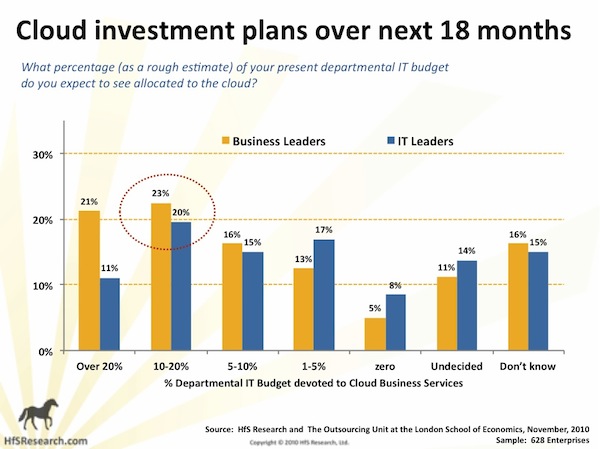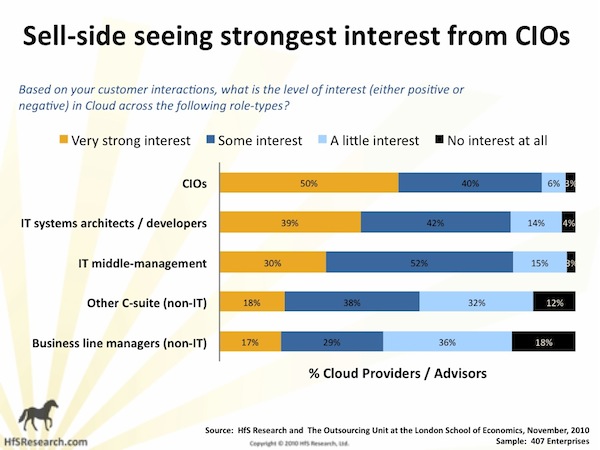Cloud is changing the future of outsourcing: 1000 organizations have spoken


HfS Research and The Outsourcing Unit at the London School of Economics have surveyed 1053 organizations on the future of Cloud Business Services
Today's CIO is under constant pressure to drive out cost, without impacting business performance. And if tomorrow's CIO can deliver real business value beyond smart cost-management, then he or she will succeed - and should remain gainfully employed after they've stripped out whatever operational cost they can.
Our study blatantly shows CIOs are caught up in an aggressive cycle of providing services to the business that are cheaper to run, faster to access, and more relevant to driving productivity and growth. Gone are the days when CIOs demanded their shareholders underpin massive technology investments in ERP and infrastructure. Those investments have been made, and most CEOs intend never again to make capital outlays of that ilk on technology.
Enter the Cloud. This is driving a new inflection point in the provisioning of business services, that goes farbeyond straightforward outsourcing.
So why is Cloud the future?
Simply-put, many of today's large businesses have already squeezed much of the obvious cost out of their IT departments by having their lower-end support and development needs replaced or supplemented with offshore-based services, while offloading the costly burden of clunky, unnecessary IT hardware to third party IT infrastructure service providers.
For many large business that have maximized their cost-savings potential with outsourcing, Cloud computing gives CEOs hope that another inflection point is upon us, that will not only take out that next 20-30% of cost, but also empower their business functions to access best-in-class services. The potential to slim down the IT department to a "CIO and a crack team of IT service managers" is becoming very real for the sourcing-savvy organization. However, the challenge for the large organization to move to the Cloud is far more cumbersome than most smaller business, which we discussed so vibrantly here.
For the small-to-medum business, Cloud is already pretty much here - and has been for a while. You can access nearly all packaged applications in the Cloud and have a service provider deliver you the services you need via a shared-service utility model. You already have your Ultimates, ADPs, Netsuites, SFDCs and the like processing your pay checks, doing your benefits enrollments, managing your customer and employee data, hosting your accounts etc. in the Cloud - and you can choose how many staff to keep inhouse to service those functions for you, versus having them provisioned by third-party service providers.
Unfortunately, for many of the large businesses using complex ERP apps that are wrenched into all sorts of back-end databases, they are faced with some significant capital investments to find their way to a Cloud-ready environment. And it simply doesn't suit many of the Cloud-unfriendly software providers to have their clients move to a model that will save them money. The onus is moving to the service providers to build services that can take organizations on a journey of business change and technology change, which we discuss further here.
Our study shows the momentum towards the Cloud is well under way
Firstly, both IT and Business leaders already plan to devote a significant portion of their IT budgets to investing in Cloud. While business executives are understandably bullish, it's significant that a third of IT executives already see at least 10-20% of their budgets going into Cloud services in the medium-term:
Secondly, the impetus behind Cloud is coming from the top-down. As awareness of Cloud across business leaders increases, so does the pressure on the CIO to develop a Cloud roadmap for their organization. The industry advisors and providers of Cloud see half the CIOs with whom they interact, showing a very strong interest in Cloud, with the less senior IT professionals showing less enthusiasm:
The Bottom-line: CIOs need to broaden their skills beyond provisioning outsourcing delivery and Cloud fits the bill
CIOs need to be seen as innovators, constantly embracing IT delivery models that provide the business with faster, cheaper and more relevant business applications. Many have had to become the conduits for IT outsourcing over recent years, as business leaders demanded cheaper IT provision. The same is happening with Cloud, as more evidence of faster, cheaper, more relevant business services materializes.
Thanks to all of you who took the time to share their views with us on Cloud, and the impact they expect it to have on their organizations: we gleaned the views of over 1000 business (non-IT) executives, IT executives, in addition to industry stakeholders. This has proven to be most comprehensive study ever performed, that has used a vast social media network to canvass such a broad population of our industry.
We would like to thank the Outsourcing Unit at the London School of Economics, which partnered with us to help design and analyze the study, and also John (you know who you are), who introduced us in the first place to make this all happen.
As a special thank you to our industry for investing time to make this study happen, you can access your freemium copy of the executive report "Cloud Will Transform Business As We Know It: The Secret’s In The Source", by clicking here

